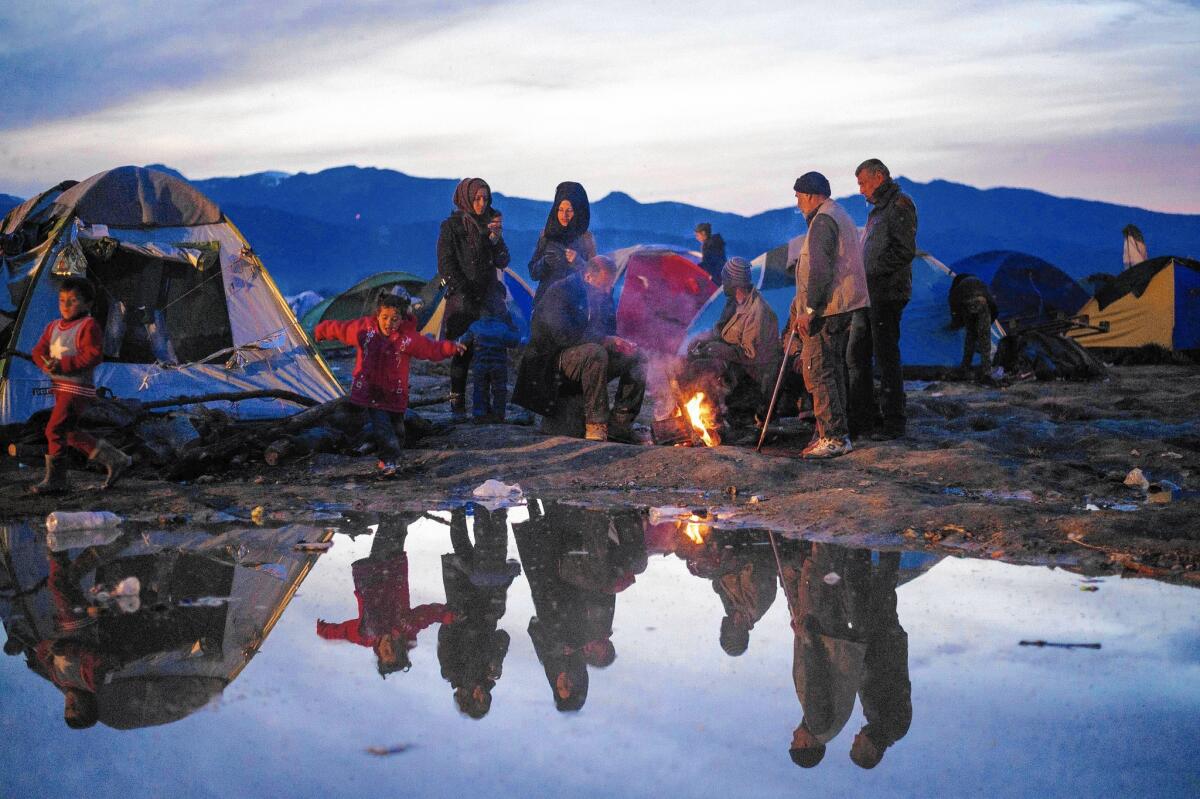Human rights groups criticize European Union-Turkish plan to stop Syrian migrants

- Share via
reporting from LONDON — A plan by European Union and Turkish officials to stop migrants arriving on Europe’s shores by immediately sending them back to Turkey has been branded deeply immoral and possibly illegal by several human rights and refugee groups.
The proposal was announced by EU leaders Tuesday after lengthy negotiations in Brussels aimed at finding a way to discourage thousands of people fleeing fighting or poverty from trying to cross the Aegean Sea into Greece daily.
More than 130,000 men, women and children have made that journey this year and Europe has become bitterly divided over how to share responsibility for the crisis, with some nations implementing their own ad hoc border controls.
This latest attempt at a solution has not yet been approved but could see the 28-nation EU officially take in one Syrian refugee from Turkey for every migrant returned to Turkey from Greece. It would also see billions of dollars more in refugee aid sent to Turkey, faster EU membership talks with Ankara and visa-free travel for its citizens within four months.
The Office of the United Nations High Commissioner for Refugees said it was distancing itself from the proposal amid deep concerns over its legality.
Aid groups also swiftly renounced the plans as the actions of a desperate and divided continent that is failing to stand up for fundamental human rights and an internationally recognized asylum process.
“The entire purpose of this deal is to outsource Europe’s responsibilities to take care of refugees,” said Gauri van Gulik, Amnesty International’s deputy director for Europe and Central Asia, who scathingly described the idea as akin to “horse-trading” with extremely vulnerable people.
“All of this is aimed at keeping people out of Europe. It’s incredible to witness how desperate Europe has become that it’s seeing Turkey as its savior,” she said.
Turkey now houses nearly 3 million migrants, the vast majority of whom have fled conflict in Syria, Afghanistan and Iraq. Every day as many as 2,000 people attempt to journey by sea to Greece with dreams of claiming asylum in wealthier parts of Europe.
Many fall prey to people smugglers along the way who charge exorbitant fees.
European leaders are scrambling to stop this practice and control the flow of people, conscious that the longer they falter, the higher the human cost.
To that end, the North Atlantic Treaty Organization announced Sunday that it was deploying warships to Greek and Turkish waters to assist the EU’s Frontex border agency, and British Royal Navy vessels will patrol the route.
But Van Gulik said the new plan suggested by EU leaders was “unethical and unworkable.”
“The EU is treating Turkey as the only solution it has to the refugee crisis,” she said. “For Europe [it seems] absolutely impossible to share the responsibility and do the decent thing.”
About 34,000 migrants are stranded in various parts of Greece after Macedonia recently closed its southern border, allowing through only a limited number of Syrian refugees daily and turning back others.
Austria, Croatia, Slovenia and Serbia to the north were supportive of the move, but it has caused a perilous buildup of people in northern Greece’s Idomeni camp, where living conditions are fast deteriorating.
On Tuesday, Slovenia also announced it would demand EU visas on its borders as of midnight, in effect closing the migrant route into Central Europe entirely.
The muddled and inconsistent European response placed Turkey in a strong bargaining position going into Monday’s summit.
Prime Minister Ahmet Davutoglu arrived with a list of proposals he hoped to secure in return for cooperation, which reportedly caught EU leaders by surprise.
Human rights experts derided the move as using tens of thousands of deeply traumatized people fleeing conflict as a “political football.”
“People do seem to forget that they are actually people, very vulnerable people who really do need protection as a priority and that’s a huge issue for us,” said Dr. Natalie Roberts, an advisor on refugees and migration at Doctors Without Borders.
Many human rights experts also fear that shutting down safe and legal routes into Europe and creating a “one in, one out” system will not only overload Turkey, which is already struggling to process so many people, but also force migrants to attempt more dangerous routes into Europe.
“Smugglers exist because there is a market for smugglers,” Roberts said. “This will make the smugglers more clandestine, more expensive for people, but also more dangerous for people. They use smugglers because they have no other choice.”
Boyle is a special correspondent.
More to Read
Sign up for Essential California
The most important California stories and recommendations in your inbox every morning.
You may occasionally receive promotional content from the Los Angeles Times.











